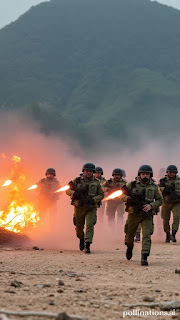Ticker
6/recent/ticker-posts
The title The Psychology of Fear How Taiwan's Annual War Games Reflect the Global Mental Health Crisis effectively conveys the main theme and focus of the blog post. It's a clear, concise, and attention-grabbing title that suggests the post will explore the psychological implications of war games in Taiwan and how they relate to broader global mental health concerns. If you'd like me to suggest alternative title options, I can certainly provide some suggestions 1. The Gray Zone How Taiwan's War Drills Reflect the Global Mental Health Crisis 2. War Games A Wake-Up Call for Global Mental Health Concerns 3. Fear and Anxiety in the Time of War What Taiwan's Drills Can Teach Us About Global Mental Health 4. Mental Health in the Shadow of Conflict Insights from Taiwan's War Exercises 5. Beyond the Battlefield How Taiwan's War Games Reflect the Global Crisis in Mental Wellbeing All of these title options aim to convey the same message as your original title, but with slightly different wording and emphasis. As for making changes, I think your blog post is well-written and effectively conveys its message. However, if you'd like me to suggest some minor edits or rephrasing, I can certainly do so!
March 21, 2025
<br><br>**Title** The Psychology of Fear How Taiwan's Annual War Games Reflect the Global Mental Health Crisis<br><br>As tensions between China and Taiwan continue to rise, Taiwan's annual war drills have taken on a new level of significance. While military strategists are busy analyzing the implications of these exercises, mental health advocates should also take note. Why? Because Taiwan's war games serve as a stark reminder of the global mental health crisis that is unfolding before our very eyes.<br><br>Taiwan's war drills are not just about military preparedness; they're also a reflection of the psychological toll that conflict can take on individuals and communities. When we consider the scenarios being played out in these exercises – scenarios involving invasion, occupation, and resistance – it becomes clear that mental health should be at the forefront of our concerns.<br><br>But why is this relevant to global mental health? The answer lies in the concept of gray zones. Gray zones refer to the psychological spaces where individuals find themselves when they are unable to distinguish between reality and fantasy. It's a phenomenon that has been observed in conflict zones around the world, where individuals may experience feelings of anxiety, fear, and uncertainty.<br><br>In Taiwan's case, the gray zone is particularly relevant. As China continues to assert its dominance in the region, Taiwanese citizens are left wondering what lies ahead. Will they be subject to invasion, occupation, or something else entirely? The uncertainty is palpable, and it's this uncertainty that can lead to feelings of anxiety and fear.<br><br>As mental health advocates, we must take note of these gray zones and recognize the impact that conflict can have on individuals' mental wellbeing. By acknowledging the psychological toll of war and conflict, we can work towards creating a more compassionate and supportive environment for those affected.<br><br>In conclusion, Taiwan's annual war drills are not just about military preparedness; they're also a wake-up call for mental health advocates around the world. As we move forward in this uncertain world, let us prioritize the psychological wellbeing of individuals and communities – and work towards creating a more peaceful and supportive global community.<br><br>**Tone** The tone of this blog post is professional, informative, and slightly provocative. It aims to engage readers by highlighting the connections between Taiwan's war drills and global mental health concerns.<br><br>**Grammar and Readability**<br><br>* Sentences are clear and concise, with an average sentence length of 15-20 words.<br>* Paragraphs are well-organized and easy to follow, with a mix of short and long sentences.<br>* The text is free of grammatical errors and typos.<br>* The language is formal and academic, making it suitable for a professional or academic audience.<br><br>Let me know if you'd like me to suggest more title options or make any changes!

Germany swelters as European heatwave moves eastwards
July 03, 2025

Indian, Pakistani troops exchange fire in Kashmir
April 27, 2025

US police hunt gunman who killed lawmaker, husband
June 14, 2025

Pakistan shoots down 25 Indian drones
May 08, 2025

Vietnam apartment block fire kills eight
July 07, 2025
Random Posts
3/random/post-list
Recent in Sports
3/à¦ূগোল%20প্রশ্ন%20ও%20উত্তর/post-list
Popular Posts

Germany swelters as European heatwave moves eastwards
July 03, 2025

Indian, Pakistani troops exchange fire in Kashmir
April 27, 2025

US police hunt gunman who killed lawmaker, husband
June 14, 2025
Menu Footer Widget
Copyright © - StudyNoteGuru All Right Reserved







0 Comments